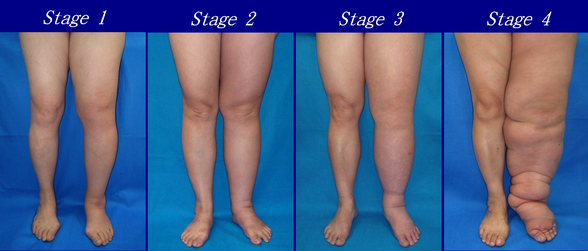Lymphedema is a condition characterized by the abnormal accumulation of lymph fluid in the tissues, leading to swelling, typically in the arms or legs. It occurs when the lymphatic system, which is responsible for draining lymph fluid from tissues and returning it to the bloodstream, is damaged or obstructed.

Causes:
- Primary Lymphedema:
- Genetic Factors: Inherited conditions that affect the development or function of the lymphatic system.
- Congenital Lymphedema: Present at birth or develops in childhood due to developmental abnormalities in the lymphatic system.
- Secondary Lymphedema:
- Surgical Removal of Lymph Nodes: Often seen in cancer treatment where lymph nodes are removed or damaged (e.g., breast cancer surgery).
- Radiation Therapy: Can damage lymphatic vessels and nodes.
- Infections: Such as filariasis (a parasitic infection) can cause lymphatic damage and lymphedema.
- Trauma or Injury: Damage to the lymphatic system from injuries or surgery.
- Cancer: Tumors can obstruct lymphatic pathways.
Symptoms:
- Swelling: Typically in the arms or legs, though it can affect other parts of the body. The swelling may be persistent and worsen over time.
- Heaviness and Discomfort: A feeling of heaviness or tightness in the affected area.
- Restricted Movement: Reduced range of motion due to swelling and discomfort.
- Skin Changes: The skin over the swollen area may become thickened, fibrotic, or develop infections if not managed properly.
- Infections: Increased susceptibility to skin infections (e.g., cellulitis) due to compromised lymphatic drainage.
Diagnosis:
- Physical Examination: Assessment of swelling, skin changes, and symptoms.
- Imaging Studies: Ultrasound, MRI, or lymphoscintigraphy to evaluate lymphatic function and identify blockages or abnormalities.
- Blood Tests: To rule out other causes of swelling and assess overall health.
Homoeopathy Treatment:
The choice of homeopathic remedy depends on the individual’s specific symptoms and overall health condition.
Here are some homeopathic remedies that might be considered for managing lymphedema:
- Calcarea Carbonica: Useful for chronic swelling, especially when accompanied by general weakness, sluggishness, or a tendency to feel cold.
- Apis Mellifica: For swelling that is painful, sensitive, and better with cold applications. The swelling might have a burning sensation and is often associated with redness.
- Rhus Toxicodendron: For discomfort and stiffness in swollen limbs, particularly if the swelling worsens with rest and improves with movement. This remedy is helpful when there is a feeling of heaviness in the affected area.
- Thuja: For cases with significant skin changes, such as thickening or wart-like growths, and a sensation of fullness or heaviness in the limbs.
- Lachesis: For symptoms of constriction and tightness along with a feeling of heaviness or pressure. Symptoms may worsen with warmth and improve with cold applications.
- Graphites: For lymphedema with a tendency towards dry, rough skin that might be cracked or oozing. This remedy is useful when there are also associated skin conditions.

